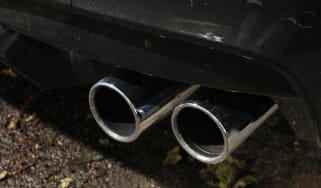New Vehicle Risk Ratings replace UK car insurance groups to bring clarity on costs
The car insurance industry has launched new Vehicle Risk Ratings, to give fresh insight into car insurability and costs

Car insurance group ratings are being replaced with a system assessing new cars across five core characteristics – performance, damageability, repairability, safety and security.
Under the new Vehicle Risk Rating (VRR) scheme, every car that goes on sale in the UK from 1 August this year will be rated in each of the five categories above.
Just nine new models have been assessed so far, but Thatcham Research, the insurance industry data intelligence company masterminding the changes, says it must build a critical mass of data before car buyers get to see it – potentially as soon as early 2025.
“Vehicle Risk Rating (VRR), which represents an evolution from the current 1-50 group rating system, aims to transition the industry towards a more granular modelling approach for car insurance,” said a Thatcham spokesman, following the scheme’s announcement on 24 Sept.
“It is important to note that new vehicles will be assessed against the current group rating system which will be in operation for at least the next 18 months, during which time the scores will continue to be published. New vehicles will also be assessed against the new Vehicle Risk Rating system,” he added.
“Once we reach a critical mass of data to make meaningful assessments against the insurability pillars, we will be making the data available to consumers.”
Mark Shepherd, head of general insurance at the Association of British Insurers (ABI), welcomed the move, saying: “The new rating system is a great step forward to allow more detailed risk assessments of the changing automotive landscape. We also hope it will encourage manufacturers to consider things like security and repairability more closely when designing new cars for UK roads.”
The new system is intended to highlight potential issues like EV battery damage causing cars to be written off, or Chinese brands failing to support products effectively with spares parts, as reported previously by Auto Express.
The car industry has reacted coolly to the news, with manufacturers seemingly caught off-guard by the new VRRs.
Mike Hawes, SMMT Chief Executive told Auto Express: “A more comprehensive and accurate assessment of vehicle insurability could be good news for consumers if it leads to lower insurance premiums.
“However, whilst we are aware the new Thatcham Vehicle Risk Rating will be launched soon, manufacturers have not yet been given a full understanding of how the scores will be calculated. Given vehicles take three to five years to develop, and the system is due to go live in 18 months’ time, manufacturers would have preferred more time to ensure models can be engineered in line with the new ratings.”
The new VRR insurance ratings explained
Each of the five risk categories will generate a Vehicle Risk Rating (VRR) from 1 to 100, with a higher number indicating a greater level of risk. One of the core pillars, ‘repairability’, is an entirely new assessment that examines the availability of “a transparent and accessible repair strategy”, according to the industry.
Additionally, whereas the existing car insurance group ratings have always been fixed at a vehicle’s launch, the new Vehicle Risk Ratings will be dynamic, so can respond to a changing risk profile with ongoing vehicle development.
“Until relatively recently, insurers could rely on their historical experience of vehicle types, combined with driver data, to determine premiums,” explained Jonathan Hewett, chief executive at Thatcham.
“This is no longer viable in today’s fast-paced environment where it’s important to understand the influence of rapidly developing ADAS on accident frequency and severity, the impact of new security technology in staying ahead of the criminal gangs and the challenges electrification and new vehicle structures present to sustainable repair.
“In a technology driven world, research and vehicle focused assessments are vital to informing this process, enabling insurers and their partners to see the road ahead with absolute clarity and confidence.”
A Thatcham spokesman told Auto Express that the new rating regime would benefit consumers too, as it will bring insurance into line with other consumer products by unpacking the individual elements that contribute to risk. He pointed to the mobile phone market as an example, where a buyer might compare aspects such as screen resolution, battery life and user interface when choosing a product.
“Cars on sale after 1 August will have an overall figure, and vehicle manufacturers will be able to break that down into five pillars and showcase performance in those areas,” he said. “It’s up to the car manufacturers to make that data accessible, and we’re working with them on that.”
Within two years, all insurer and related systems should be ready to integrate with the five VRR assessments, ensuring policies and premiums will be offered that take into account a much broader range of vehicle characteristics.
Thatcham is also keen to stress that the two-digit VRR numbers that will form the basis for premium costs over the next two years should not be compared with the old insurance group rating numbers. Instead, “the plan after two years is to have the five ‘pillar’ scores individually respected by both car manufacturers, the government, the insurers and consumers,” the spokesman said.
What are the core five Vehicle Risk Rating assessments?
- Performance – Evaluates vehicle characteristics such as speed, acceleration, and the impact of modern powertrains.
- Damageability – Assesses how design, materials, and construction influence repair costs and damage severity.
- Repairability – Focuses on the ease and cost of repairs, encouraging repair-friendly vehicle designs.
- Safety – Analyses active and passive safety systems, including crash avoidance features.
- Security – Examines physical and digital security measures, leveraging Thatcham Research's New Vehicle Security Assessment expertise.
Want the latest car news in your inbox? Sign up to the free Auto Express email newsletter...
Find a car with the experts









